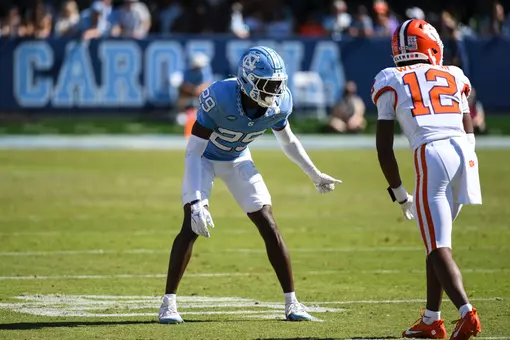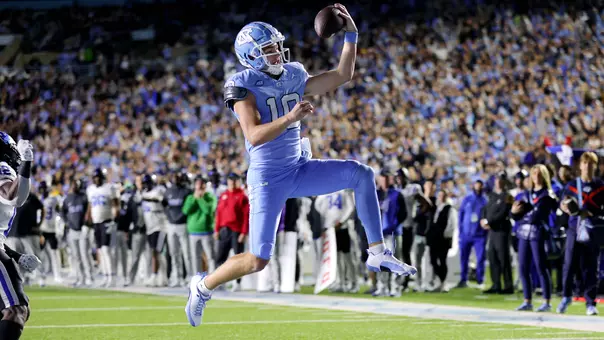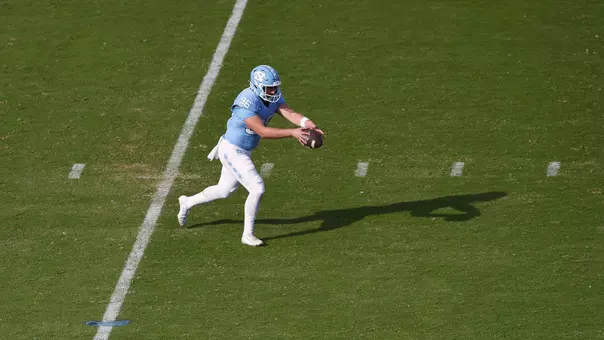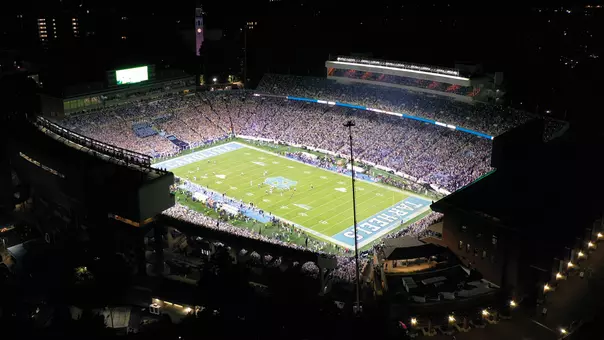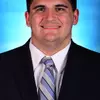University of North Carolina Athletics
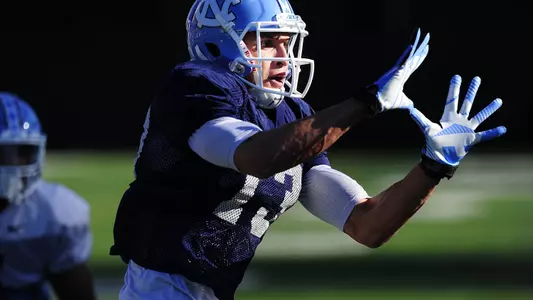
Extra Points: One More
April 11, 2016 | Football, Featured Writers
By Lee Pace
Another spring practice is in the books. Tar Heel Coach Larry Fedora might commend his team—“Great competition today, guys”—or he might scorch them—“Way too sloppy today, our focus was off.” Scheduling details are covered, the constant reminder to hydrate is made once again. The training table and a nice dinner beckon.
But not so fast. There's something left to be done.
One more.
“Everyone else in America is leaving the field, but we're doing one more,” offensive coordiantor Chris Kapilovic says. “It's the little things, the details, that keep you from winning a championship.”
“You have to do something different than you've ever done to get somewhere you've never been,” linebackers coach John Papuchis adds. “We were close a year ago. Now we want to win the ACC championship. What do we have to do to get over that last hurdle? 'One more' every day adds up.”
After Fedora dismisses the team post-practice, the players break into individual positions or the offense or defense as a whole gather for from five to 15 minutes of “extra credit” as they called it in middle school.
If one receiver drops an easy pass during seven-on-seven, the entire group might reconvene post-practice to the “jugs” machine, with each player looking the ball into his hands rep after rep on passes from the automatic throwing apparatus.
If the running backs are sloppy protecting the ball during team period, they might run through a chute with dozens of rubber “arms” that pound at their hands, wrists and arms and force their focus on carrying the ball high and tight.
One offensive lineman might hone his pass-protection footwork while another focuses on drive blocks.
One recent day, center Tommy Hatton was off the mark on snaps to the quarterback from the shotgun formation, so Kapilovic spent 15 minutes working on technique as Hatton snapped dozens of balls to quarterback Caleb Henderson .
“When you play center, your arm motion has to be same every time,” Kapilovic says. “You have to develop muscle memory. Sometimes when a center sees guys coming at him, he'll get a little geeked up and throw it too hard. Tommy will also curl his hand releasing the ball, like you'd doing throwing a forward pass. Then he gets high and off to the side. You can't have that motion when snapping the ball.
“That's what we take the extra time to work on.”
The Carolina defense spent 15 minutes after the end of each practice the first week of spring ball in early March to focus on third-down stops. Through 12 regular season games last fall, the Tar Heels yielded 43 percent third-down conversions. But in losses to Clemson and Baylor, they gave up first downs on 19 of 35 opponent attempts.
“The extra work will make us better,” linebacker Cayson Collins says. “The more time you put into something, the better at it you'll be. Third-down defense is a point of emphasis this spring. An extra five or 10 minutes put into something over the course of time adds up to hours. It's an amazing philosophy.”
The “one more” mindset evolved from the team's second-annual two-day session in February with The Program, a specialized consulting firm that helps sports teams and businesses develop leadership, teamwork and discipline skills. Marine Master Sergeant Jamey Slife led the sessions and talked to the team and coaches about a military ethos built around a commitment to three core principles.
“One, we are mentally and physically tough,” Slife says. “Two, we do not make excuses and we don't allow others to make excuses for us. Three, we work hard. And we describe working hard as 'One more.'”
Slife cited a personal experience of having taken a martial arts course that was seven weeks long, with training sessions from 7:30 a.m. to 4:30 p.m. Before he left for the day, he picked one element that was weak—falling. “I spent six minutes practicing falling—falling left, falling right,” he says. “I did it until I got good at it. I established a habit for myself of working on something for six minutes every day. You don't take a day off.”
Slife uses time periods with one minute added to the comfortable and oft-used five-minute increments of five, 10 or 15 minutes and hones the idea that six, 11 or 21 minute “one more” sessions add up over time.
“The concept is for it to be short enough that you can do it every single day,” Slife says. “You are constantly getting better by taking the extra time. It becomes habit forming.”
Senior cornerback Des Lawrence had 14 pass breakups in 2015 and says he wants to turn those into interceptions this fall.
“I'm spending extra time on closing speed, hand work, playing the ball in the air better,” he says. “I'm working on finding the ball in the air, turning to it and becoming a receiver instead of a DB.
“You've got to do something to give yourself an advantage,” he says. “It one team's working two hours, we have to go two hours and 10 minutes. You have to find a way to get an edge.”
Chizik most every day winds down practice and the defense's “one more” with snippets from famous quotes or books he's read about success, focus, competition and achievement.
“Guys, if you want to develop championship habits, you have to have a capacity for boredom,” he tells his players one day. “If you want to do something and be good at it, you have to do it over and over and over and over again. If you want to get the quarterback, you'd better master the shrug release. If you want to cover a receiver, you'd better learn to back pedal. Do them until they become second nature.”
In other words, do it once more.
Chapel Hill writer Lee Pace has been writing “Extra Points” since 1990 and has been covering the Tar Heels from the sidelines with the Tar Heel Sports Network since 2004. Follow him on @LeePaceTweet.











